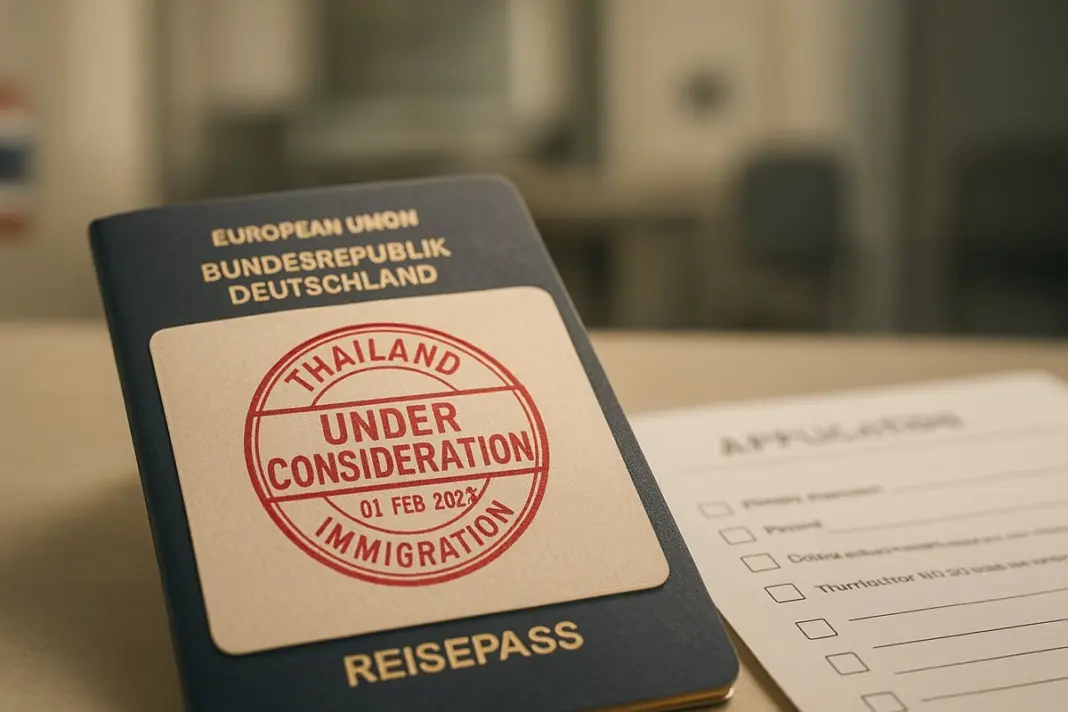The ‘Under Consideration’ Stamp: A Common Expat Dilemma
Every foreigner in Thailand knows the feeling. You’ve submitted your visa extension. The waiting game begins. Your passport now sports a bold ‘Under Consideration’ stamp. But what does this status actually mean? And what crucial dates and duties must you keep in mind?
It’s not just newcomers who worry. Even seasoned expats can get caught out. Misunderstandings here can lead to fines, visa rejections, or even bans. “One wrong move and you’re in trouble,” warns long-term resident John, 62.
Visa Validity vs. Permitted Stay: The Legal Basics
Thailand’s immigration law draws sharp lines between visa terms. A visa is simply your ticket in, issued by embassies abroad. Its ‘validity’ is just the last day you can enter Thailand—not how long you can stay.
The real key is the ‘Permitted Stay’ date stamped in your passport on arrival. That’s your legal deadline. For retirees on a Non-Immigrant O-A, it’s usually a year—strictly no work allowed. Want to stay longer? You must apply for an extension before your current stay runs out. That’s when ‘Under Consideration’ begins.
How the Extension Process Unfolds
Apply for your extension before your current stay expires. The process varies by visa type, but the basics are the same. Immigration demands a mountain of paperwork—bank statements, marriage certificates, health checks, or more, depending on your case.
Once you’ve applied, you get the ‘Under Consideration’ stamp. It comes with two dates: when you applied, and when you must return for the decision—usually two weeks to a month later. “Don’t lose track of that return date,” warns immigration consultant Somchai.
What Does ‘Under Consideration’ Mean Legally?
This stamp is your lifeline. It means your stay is legal until the return date shown, even if your previous permission has expired. You’re not overstaying. But beware—this isn’t a guarantee. Your extension can still be refused.
If the decision isn’t ready by your return date, you’ll usually get a new stamp with a fresh date. But don’t get complacent. “You’re in limbo until the final answer,” says expat lawyer Jane.
Which Date Counts—and Why It Matters
During ‘Under Consideration’, the return date on your stamp is your new legal deadline. Use this date for all official forms, including the crucial 90-day address report. Don’t assume you must leave if your decision isn’t ready—just show up at immigration as instructed.
If you miss your return date, you could lose your extension and fall into overstay—an expensive and risky mistake.
The 90-Day Reporting Trap
Staying more than 90 days? You must report your address to immigration, regardless of your visa status. Many expats get confused during ‘Under Consideration’. The rule: if your 90-day report falls due, you must file it—even while waiting for your extension.
File 15 days before or up to 7 days after your 90-day mark. When asked for your visa expiry, use the return date on your ‘Under Consideration’ stamp. Most offices accept this without fuss.
Regional Differences: Why Rules Vary
Thailand’s immigration offices don’t always sing from the same hymn sheet. What’s accepted in Bangkok might not fly in Chiang Mai or Phuket. Some offices demand the 90-day report during ‘Under Consideration’, others don’t. Some want extra paperwork.
Frustrating? Absolutely. The best advice: ask your local office exactly what they want. “Every province is different,” sighs expat Mark, 54.
Don’t Miss Your Return Date
The return date on your ‘Under Consideration’ stamp is critical. Miss it, and you risk losing your visa extension—or worse, being marked as overstaying. Some offices allow a day or two’s grace, but don’t count on it.
If you can’t make it, contact immigration in advance. Show up on time, and you’ll get your answer—approved, you’ll get a fresh stamp for another year. Denied, you may have to leave Thailand fast.
Common Mistakes That Can Ruin Your Stay
Many expats slip up by skipping the 90-day report during ‘Under Consideration’. Others confuse the visa in their passport with their actual stay permit. Remember: only the latest stamp counts.
Another pitfall: leaving Thailand while your extension is pending. Do this, and your application is void. You’ll be treated as a new arrival, and your extension is lost.
Keep Your Documents in Order
During ‘Under Consideration’, keep your passport and all supporting documents safe and ready. Copies help, but officials want originals. Keep proof of your 90-day report, too—it could save you in a dispute.
What Happens If You Slip Up?
Miss your 90-day report? The fine is 2,000 Baht, rising to 5,000 Baht if you’re caught by police. Overstay? That’s 500 Baht per day, up to 20,000 Baht, plus a black mark in your passport. Repeat offenders risk bans—or even jail and deportation.
Special Cases and Exceptions
COVID-19 brought special rules, but those are mostly gone. Work visas and family cases have their own hurdles—often more paperwork and stricter checks. Each family member needs their own ‘Under Consideration’ stamp and must appear in person.
How to Make the Process Smoother
Apply early—at least 2–4 weeks before your stay expires. Double-check your documents. Stay in Thailand until your extension is approved—if you leave, your application dies. Mark your return date in your calendar and show up early at immigration.
Should You Use a Visa Agency?
Many expats turn to visa agencies for help. They know the ropes and can save you headaches—especially if you don’t speak Thai. But they charge extra, on top of the official 1,900 Baht extension fee. Choose carefully—some agencies are sharks.
Online Services: A Mixed Blessing
You can now file your 90-day report online, up to 15 days in advance. But the system isn’t perfect—especially for ‘Under Consideration’ cases. If it fails, you’ll have to report in person or by post.
Visa extensions themselves still require a personal visit. No shortcuts here.
When to Seek Legal Advice
If your extension is refused, or your case is complicated, consider a lawyer. They can help appeal or clarify misunderstandings. For long-term plans—marriage, divorce, or permanent residence—expert advice is invaluable.
The Rules Keep Changing
Thailand’s immigration laws are always evolving. More online services are coming, but so are tighter controls. Biometric checks and stricter databases are on the rise. Stay informed, and don’t rely on last year’s advice.
The Power of Community
Expats swap tips in forums and Facebook groups. But beware—what worked for someone else might not work for you. Always double-check with official sources.
Still, sharing stories helps. “Knowing others have survived the process makes it less scary,” says Anna, a teacher from Germany.
Cultural Tips for Dealing with Immigration
Dress smartly, stay polite, and never raise your voice. Thai officials value respect and calm. Aggression or impatience will get you nowhere. A smile and a wai go a long way.
Language Barriers and Communication
Not all immigration staff speak English. Learn a few Thai phrases, or bring a translator. Visa agencies can bridge the gap, but technology—like translation apps—can help in a pinch.
The Money Side of Visa Extensions
The official extension fee is 1,900 Baht. But you’ll also need to show proof of funds—often 800,000 Baht in the bank for retirees, or 65,000 Baht monthly income. These requirements are checked closely during ‘Under Consideration’.
Health Insurance and Medical Checks
Certain visas now require health insurance, with strict coverage levels. Expired or inadequate insurance can sink your extension. Some categories also demand a recent health certificate—don’t let it lapse.
Don’t Forget the TM.30
Your landlord must file a TM.30 to report your address within 24 hours of your arrival. If they forget, you could face problems at extension time—even if it’s not your fault. Remind them, and check it’s done.
Special Cases: Families, Investors, Students
Spouses, parents of Thai children, investors, and students all face unique rules. More documents, more checks, and sometimes longer waits. Each person needs their own ‘Under Consideration’ stamp.
Permanent Residence: The Ultimate Goal
Dreaming of staying forever? Permanent residence is possible, but tough. Only 100 per nationality are granted each year, and the process is long and costly. Even then, you’ll face a long ‘Under Consideration’ phase.
Your Under Consideration Checklist
- Start preparing four weeks before your stay expires
- Gather all required documents and copies
- Arrive early at immigration on application and return days
- Mark your return date everywhere
- Keep all receipts and confirmations
- Stay alert for extra document requests
- Don’t travel abroad until your extension is approved
Final Thoughts: Don’t Fear ‘Under Consideration’
The ‘Under Consideration’ stamp is a normal part of expat life in Thailand—not a threat. Respect the rules, meet your deadlines, and keep your paperwork in order. With care and patience, you’ll navigate the process and enjoy your stay in the Land of Smiles.




